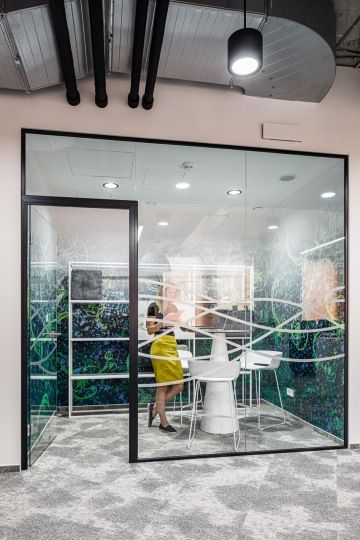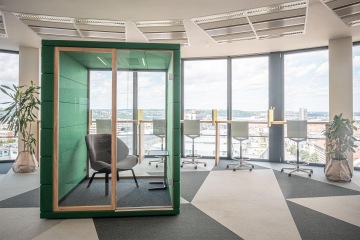The 10 main differences between office and home office etiquette

Are you one of those people who is returning to their desk for the first time after many months working from home? After such a long time away, you may have forgotten what it's like to interact with the team in real life and might have developed new habits that may not always fit into the office environment. Therefore, as a refresher, we bring you an overview of 10 differences between the office and home office, along with the basic rules of office etiquette.
1. Not all shared spaces are a kitchen

Consideration for colleagues
Garlic spread or perhaps a fish salad? At home in your kitchen it's no problem. In the office, however, you should always be as considerate as possible and minimize any disruptive elements. Strong smells spread quickly in an office space. If possible, do not eat at the desk, but use the kitchen or terrace. At least you won't make your colleagues hungry. At the same time, you will find yourself more at ease than eating in front of a monitor, where further work awaits you.
2. Hygiene and tidiness

Clean and tidy
No, this lesson isn't about basic hygienic habits, but little things that can easily be forgotten in the office space. Leaving unwashed dishes behind in inappropriate places is a no-no at home too, so be careful about clutter or spills in the office too (such as with water or food).
A higher standard of cleanliness is now expected in public spaces. It is an eternal truth that you should never leave
a mess behind for someone else to clean up. Also pay attention to the cleanliness and order of your workplace.
A mosaic of coffee stains is not a nice business card.
3. A lively office

Social interaction
After a few months of lockdown, returning to the team can be more difficult. Likewise, the rules of face-to-face communication are different than via Microsoft Teams or Zoom. In the office, you need to think about better presentation and pay more attention to social interactions. Greet every colleague you meet, even if you don't work with them in the same department. Don't be afraid (in moderation) to converse during the day. A team atmosphere thrives on liveliness and social interaction, which is one of the benefits of returning to the office.
4. Apportioning space

Reserve your place
Quarrels over who will work in the bedroom and who will have to use the laptop in the kitchen have become quite common in many households where several members work from home. However, the office requires a more careful approach without a needless tug-of-war. Conference rooms are always booked at least 24 hours in advance and only if you really need them. And definitely do not disrupt the meeting with phone calls that can be handled, for example, from a phone booth or phone box.
5. Be mindful of sources of noise

Noise reduction in the office
In the office, a larger number of people are concentrated in one place. However, they can hardly find a place to concentrate with loud ringtones and notifications sounding every minute. Another problem is playing music or making a loud call. But noise problems in the office can be solved by various acoustic elements and measures, from panels to acoustic seating or micro offices.
6. Badmouthing colleagues

Avoid gossiping
"His shirt is ugly", "She doesn't meet deadlines." Naturally, not everyone gets along in the workplace. But in terms of etiquette – not only in the office – it is advisable to avoid gossip offline and online. It just needlessly poisons the working atmosphere. For potential conflicts, it is much more appropriate to set up processes and leave the solution to joint meetings.
7. Jokes and concentration don't go together

Space for joking
The difficult period and the forced transition to the online environment were a breeding ground for memes and other funny content. After all, we'd all go crazy without
a little humour at work. But everything has its place. Your funny chain e-mails and anecdotes might make you laugh, but they can also distract you from focused work. Pick your spots to joke around with a view to allowing others to work.
8. Punctuality

Learn to walk on time
Getting up isn't a popular activity, but the same is true of waiting for tardy individuals. When you arrive late for
a meeting or miss an important deadline, you show that you do not care about your colleagues' time. While
a teleworker can connect from home at the last second, returning to the office demands stricter time management and reserves to account for travel, etc. Keep in mind that punctuality is also a part of office etiquette.
9. Dress code

Appearance matters
Leave the sweatpants at home. Your office clothes require a certain degree of taste. While staff at a start-up hardly need to rush to work in a suit, it is always necessary to think about the company's dress code. Another important aspect to keep in mind is that your appearance represents the company in negotiations with third parties.
10. Illness

Take advantage of sick days
Nowadays, this is probably the most important rule: if you feel sick, don't go to the office! Many employers are already able to provide at least short-term work from home and thus avoid the spread of disease among colleagues. Blowing your nose and coughing has never been "in", and during a global pandemic is not only a faux pas but also a threat to the health of everyone around you.
Workspaces designed for a changing world
The above list could certainly be supplemented by other points, but the offices themselves also play an important role in how easy it is to adhere to office etiquette. We will be happy to help you implement offices that are great to work in and where colleagues can get along. Contact us today. We will take care of your project from start to finish.
Author of photos: Petr Andrlík, Prokop Laichter, Adam Fuchs & Lukáš Prokůpek
Published August 11, 2021